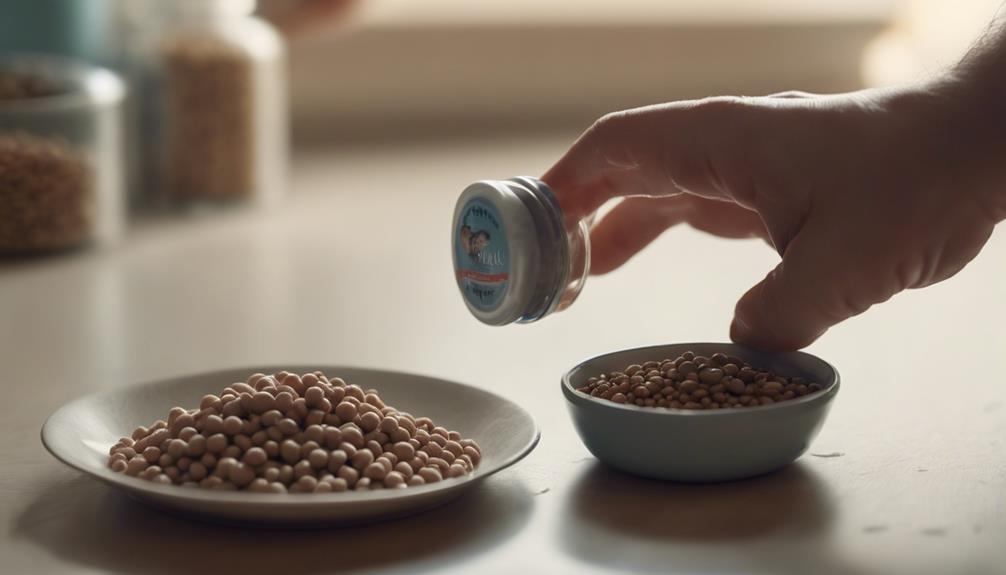Key Takeaways
- Use kitten-specific bottles and milk replacer for feeding.
- Position the kitten correctly and encourage latching for nursing.
- Follow a strict feeding schedule and start weaning at 4 weeks.
- Monitor kitten’s health, weight gain, and consult a vet if needed.
Essential Supplies for Bottle-Feeding
When preparing to bottle-feed a newborn kitten, acquiring the essential supplies like baby bottles designed for kittens and kitten milk replacer is crucial for their proper nourishment and care. Opt for baby bottles with nipples specifically crafted for kittens to facilitate feeding. It’s important to use kitten milk replacer instead of cow’s milk, as it provides the necessary nutrients for a kitten’s growth. Consider using nipples with a small hole to control the milk flow and ensure proper feeding. Kitten milk replacer comes in liquid or powder form, which can be warmed before feeding to make it more appealing to the kitten. By having these supplies on hand, you can ensure the well-being and health of the newborn kitten.Techniques for Proper Feeding
To ensure optimal nourishment and care for a newborn kitten during bottle-feeding, employing proper techniques is essential for promoting healthy feeding habits and overall well-being. When feeding a kitten with a bottle, consider the following techniques:- Positioning the kitten on its stomach for feeding
- Gently holding the kitten’s head to encourage latching
- Mimicking the mother cat’s nursing position
- Gentle face/head rubbing if the kitten refuses to suckle
- Caution with using a syringe for feeding
Feeding Schedule and Weaning Process

Maintaining Kitten’s Health
Ensuring the ongoing well-being of a bottle-fed kitten involves vigilant monitoring of its health indicators and prompt action in response to any concerning developments. It is crucial to maintain the health of the kitten by following these key practices:- Regularly assisting kittens with bodily functions by gently rubbing their belly
- Monitoring weight gain by weighing kittens daily to ensure they are gaining 3-4 ounces weekly
- Observing for signs of health issues such as crusty eyes or a runny nose
- Consulting a vet if the kitten is not thriving despite proper care
- Ensuring the kitten receives appropriate nutrition and hydration to support its overall health and development.
Proper Positioning for Feeding

Monitoring Weight Gain
 Proper monitoring of a newborn kitten’s weight gain is essential for assessing its growth and overall health. Regular weight checks can help identify any issues early on and ensure the kitten is developing as expected. Here are some key points to consider when monitoring weight gain:
Proper monitoring of a newborn kitten’s weight gain is essential for assessing its growth and overall health. Regular weight checks can help identify any issues early on and ensure the kitten is developing as expected. Here are some key points to consider when monitoring weight gain:
- Weigh the kitten daily to track progress accurately
- Aim for a weight gain of 3-4 ounces per week
- Use a reliable scale designed for weighing small animals
- Consult a veterinarian if there are concerns about weight gain
- Keep a record of the kitten’s weight to monitor trends over time
Frequently Asked Questions
Can Kittens Be Bottle-Fed With Regular Cow’s Milk if Kitten Milk Replacer Is Not Available?
When considering bottle-feeding kittens, it is crucial to provide them with appropriate nutrition. While kitten milk replacer is preferred due to its resemblance to a mother cat’s milk, regular cow’s milk is not recommended as it lacks essential nutrients vital for a kitten’s growth and development.How Can I Tell if My Kitten Is Getting Enough Milk During Feedings?
Ensuring a newborn kitten is receiving adequate milk during feedings involves monitoring its behavior. Signs of sufficient milk intake include contentment after feeding, weight gain, and regular bowel movements. Consulting a veterinarian for guidance is advisable if concerns arise.Is It Normal for Kittens to Have Difficulty Latching Onto the Bottle Nipple?
It is common for kittens to experience difficulty latching onto bottle nipples due to their instinctual need for a mother’s nursing. Gently guiding and encouraging them to latch can help overcome this challenge.At What Age Should I Start Introducing Solid Food to My Bottle-Fed Kitten?
Introducing solid food to a bottle-fed kitten should commence around 4 weeks of age. Begin with spoon-fed formula and gradually transition to wet kitten food. Monitor the kitten’s response and consult a vet for guidance on the weaning process.How Can I Help a Kitten Who Seems to Be Struggling With Digestive Issues Despite Proper Feeding and Care?
To address a kitten struggling with digestive issues despite proper care, a vet consultation is crucial. Differential diagnoses may include infections, food intolerances, or gastrointestinal disorders. Dietary adjustments, medications, and monitoring can help manage the kitten’s health effectively.Should I Use Kitten Formula When Bottle-Feeding a Newborn Kitten?
When it comes to feeding orphaned kittens, using kitten formula is crucial for the proper nutrition of a newborn kitten. Kitten formula is specially formulated to meet the specific needs of young kittens, providing essential nutrients for their growth and development. It is important to follow the recommended feeding guidelines for the best results.




